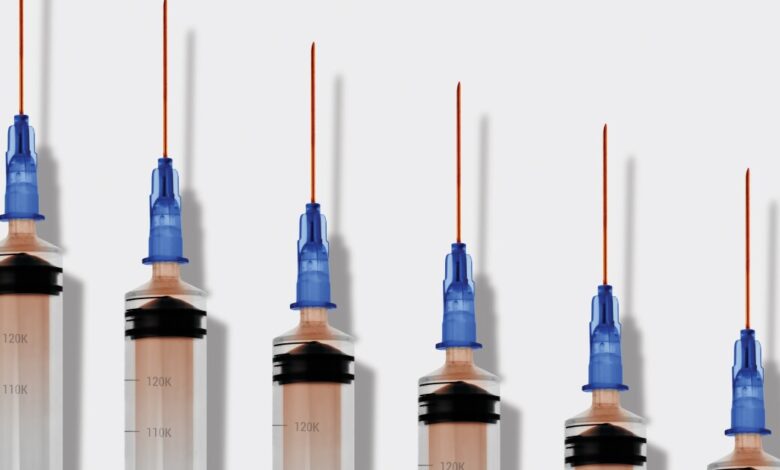At One University, Resistance to a New Covid Policy Comes From Inside the House

[ad_1]
Throughout the coronavirus pandemic, faculty members have often been the campus constituency pushing for the strictest anti-Covid measures. But at Fordham University, dozens of instructors are protesting its announcement that community members must submit proof that they’ve received a bivalent booster shot — the Centers for Disease Control and Prevention’s latest Covid-shot recommendation — by November 1.
Some put together a petition calling for an end to the booster requirement. As of Friday the petition had 100 signatures, including some staff members. Families, and some students and staff members, have circulated a much larger petition.
The Fordham debate reflects the complexity of Covid-mitigation policies at colleges amid Americans’ increasing ambivalence about additional shots. In an environment of intense opposition to, and politicization of, all Covid vaccines, relatively few colleges seem to have mandated the latest booster, despite the CDC’s recommendation. No College Mandates, a group opposed to Covid-vaccination requirements, counts about 20 bivalent-booster mandates nationwide, out of nearly 2,000 colleges in its database.
The Fordham policy’s opponents say they fear the side effects of Covid vaccines, while believing that the latest booster won’t prevent them from passing infections on to others. “This is pure speculation that these vaccines are necessary,” said Nicholas Tampio, a professor of political science and a leader of faculty resistance to Fordham’s vaccine policy. “We should allow everybody to decide for themselves whether to get this particular bivalent booster.”
The documented risks of Covid vaccines are real but rare. Out of every one million doses of Covid vaccines administered to men ages 18 to 24, the group at highest risk of heart problems after vaccination, the government reports about 60 verified cases of myocarditis, or inflammation of the heart tissue. Most myocarditis patients get better quickly, according to the CDC, although scientists are still studying possible long-term effects. Another recent study found that getting Covid vaccines can sometimes alter menstrual periods. The study’s authors wrote that the change was likely to be temporary.
Meanwhile, evidence is strong that Covid vaccines prevent severe illness and death in people who get them. But there is uncertainty over how well the latest booster prevents people from getting infected and infecting others. Over the summer, the Food and Drug Administration’s advisers supported the development of a bivalent booster intended to better protect people against the coronavirus’s Omicron variants, which have become dominant in the United States. The importance of administering the shots to the public before an expected winter surge — a possible additional wave of infections and deaths — meant there wasn’t time for human studies of the booster’s effectiveness. The FDA depended on studies of mice, in a process similar to what it uses to develop annual vaccines against the flu, which, like the coronavirus, evolves too quickly for extensive study before each flu season.
Thus, for those unconvinced of the booster’s personal benefits, there’s no exact measure of how well the latest booster protects others, either. Opponents of the Fordham policy told The Chronicle they think the benefit is zero. (Relying on some possible but unknown benefit is “straining the argument,” Tampio said.) If the current booster acts like previous ones, it may reduce people’s risk for catching the coronavirus for some time, and then fade over a period of months.
Fordham, a Jesuit university in New York City, is assuming the bivalent booster will protect the community by reducing infections. “You reduce transmission by reducing the number of sick people. If people don’t get sick, if people don’t contract the virus, they don’t transmit it,” said Bob Howe, a Fordham spokesperson. “Even if all we did was reduce hospitalization and death rates, that would be worth it.”
Fordham doesn’t have a medical school, or the same deep bench of infectious-disease experts as some colleges, including a few that also have bivalent–booster mandates. In Fordham’s situation, it’s reasonable to rely on the CDC’s recommendation, Howe argued.
It’s not clear how prevalent opposition to the vaccination requirement is among Fordham’s faculty. The university employs about 2,200 adjunct and full-time instructors, Howe said. John J. Drummond, a professor of philosophy and president of the Faculty Senate, said he had heard from colleagues on both sides. Asked his personal stance, he said he saw the debate as one between the right to bodily autonomy and the need for collective health. “My inclination is always to come down on the side of public health and safety,” he said.
Glenn Hendler, a professor of English, said he was “proud” of the university’s vaccine stance and other anti-Covid measures it’s taken in the past. “It’s a sign of caring, for me,” he said.
No one has surveyed the faculty on the issue. The anti-mandate side is more organized and vocal, but it has more reason to be, Drummond said: “The mandate’s in effect.”
[ad_2]
Source link






